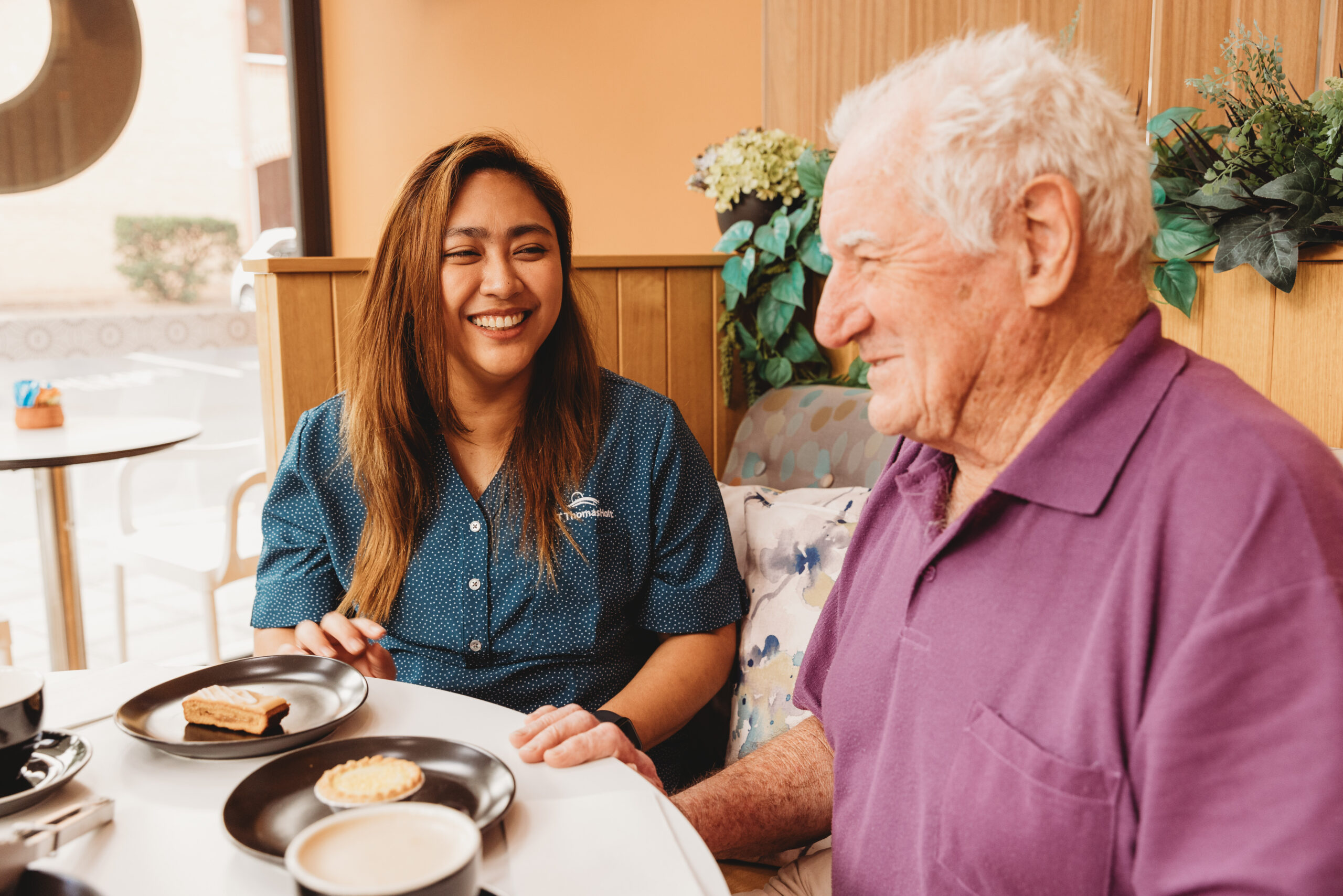We’ve been building retirement villages for over 50 years. At IRT we make it easy for you to live the life you want, in a home you love.
Find out moreIRT has been caring for older Australians for over 50 years. Experience personal and professional care in a community you’ll feel proud to call home.
Find out moreIRT has been helping older Australians live independently at home for over 30 years. Our experienced staff provide home care and assisted living services you can trust.
Find out moreAge Matters – Empowering Older Australians
An initiative of IRT Group, Age Matters empowers older Australians to live free from disadvantage by tackling homelessness, loneliness and joblessness.
Find out moreWe’re a community-owned organisation that’s been improving the lives of older Australians for 50 years.
Find out moreWe’d love to find out more about you to see how we can help. Our Customer Service team operates from 8:30am - 5pm 7 days a week.
Call us nowDon’t have time to call? Submit an online enquiry form and our friendly team will be in touch.
Enquire nowWe encourage our residents, customers, family members and other stakeholders to provide feedback about the services we provide. Your feedback helps us to continually improve our services.
Find out more
If you or your loved one needs support at home or in residential aged care, the first step is a Single Assessment System (SAS) assessment. This helps identify your care needs and the government funding available.
Funding can be used for:
At IRT we want to make your aged care journey as easy and stress-free as possible, so we’ve put together a step-by-step guide to the ACAT assessment process.
Need help with this process?

To apply, you need to be:
You can apply online via the government portal, My Aged Care.

To find out if you’re eligible, there are two steps to the assessment:
You can access the initial assessment online or by phone. Visit My Aged Care’s online assessment tool or call 1800 200 422.
What to expect in this form:
An SAS representative will visit you at your own home or in hospital to assess your care and support needs. Consider having a family member or your carer with you to offer extra comfort and help provide the information.
What to prepare before your assessment:
Expect to discuss and go through:
You’ll need to complete an income and asset assessment to work out how much you can contribute to your aged care costs. The Government will then determine how much funding you’ll receive.
Depending on the type of aged care service you need, your assessment will be done by either Services Australia or The Department of Veteran Affairs (DVA).
If you’re applying for Support at Home, your costs may include:
Contribution to the cost of independence and everyday living services. This contribution will depend on individual circumstances.
Moving into an aged care centre:
You may be asked to pay a means-tested care fee and accommodation costs.
After your face-to-face assessment, you will receive your Notice of Decision letter, which is a letter about the outcome of your assessment.
The wait times for funding depend on the Support at Home supports you are approved for.
Note: You only have 56 days to choose a service provider once you’re allocated your package.
If you need more time to find a provider you can also call MAC and ask for a 28 day extension. There are some conditions to this, for example, you can only request an extension once.
Once you’re approved for aged care services, it’s time to find a suitable provider. If you haven’t already, contact us to discuss:
If you have chosen IRT, we will work with you to develop a plan based on your care needs, goals and what is important to you. Before your services begin, we’ll provide a formal agreement to review.
What if I’m not approved for Government funding?
If you aren’t eligible for either residential aged care or Support at Home, you’ll receive a letter from your assessor outlining the reasons why.
Support at Home: We may be able to arrange private support at home services for you.
Aged care centres: You can still apply to live at one of our aged care centres and access 24/7 care in a supportive environment. You’ll just have higher fees without the Government funding.
If your situation or care needs have changed, you may now need more support or funding.
Already receiving Government-funded aged care services:
Start by contacting your current provider and request a review of your care plan. They can speak to your SAS assessor to update your plan or arrange a new assessment if needed.
You weren’t eligible in the past:
If you weren’t eligible before, your needs or circumstances may have changed since your last assessment. A benefit of the SAS assessment is you can request a reassessment at any time.
We’d love to find out more about you to see how we can help. Our Customer Service team operates from 8:30am – 5pm 7 days a week. Call us on 134 478.
Don’t have time to call? Submit an online enquiry form and our friendly team will be in touch.
For an ACAT assessment, you should have the following information:
It can take up to six weeks to get an SAS assessment once you apply, depending on how urgent your situation is and the level of care you need. If your situation is urgent because you are at risk of harm or in a crisis situation, an SAS assessment can be completed within two days.
Your assessor will determine your eligibility and level of priority based on your care needs and you current situation. You may be eligible if:
In short, yes. If you are unhappy with the decision and the level of care you have been assigned, you are able appeal assessment decision. You must submit your written application to the Department of Social Services within 28 days of the receipt date on your letter. If the outcome from this review is still not to your satisfaction, then you can apply to the Administrative Appeals Tribunal.
SAS assessors have extensive experience and are required to have a bachelor’s degree in a clinical/specialist area and complete a Statement of Attainment in My Aged Care Training, Advanced Assessment Practice.
An SAS team is usually made up of a:
SAS assessors are experienced in understanding the wide spectrum of needs of older people and knowing the various service providers in your local area.
No, there is no fee associated with the SAS assessment.
You don’t need to be alone in this process. You are more than welcome to bring along a family member, friend or a carer to your assessment. If you require a translator, this can also be arranged by your assessor.
Enter your details below to receive the latest updates from IRT directly to your inbox
© 2024 IRT Group. All Rights Reserved • Terms and Conditions • Privacy Policy
© 2024 IRT Group. All Rights Reserved • Terms and Conditions • Privacy Policy
